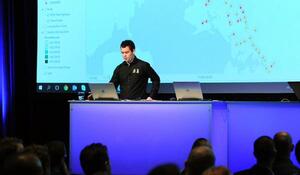
- Qualification and GIS component: Bachelor of Applied Science (Applied Geology, GIS Minor)
- Tertiary Institute: University of Otago
- Work role: Geospatial Specialist at Fulton Hogan. Previously GIS Technical Solutions Consultant at Eagle Technology; GIS Technical Solutions Intern at Eagle Technology.
Why did you choose to study GIS?
I followed a bit of a complicated path to GIS, but was always interested in pursuing something Geo’. I loved geography at High School and it was my geography teacher who encouraged me to pursue a Surveying degree at Otago. But after finding that wasn’t quite my thing, I found a liking for Geology and was mainly interested in exploration & mapping. It was in Geology where I discovered GIS and how I could use it to visualize geological units in 2D/3D and apply GIS to the work I was doing in mineral exploration. Nearing the end of my degree I decided that GIS was the field I wanted to work in and decided to stay at Otago for another year and complete a GIS component to my degree. The team at Otago was great and worked with me to tailor a GIS course to my needs which included a 400-level paper.
What are some of the benefits you’ve experienced from studying GIS?
The key benefit I’ve experienced from studying GIS is that I discovered there’s always something to learn in GIS. That might sound counter intuitive, but it’s true. Studying GIS introduced me to core concepts of spatial analysis and data management, but what you can learn and apply those concepts to goes well beyond the text book. A good GIS course will give you solid technical foundations and teach you to be inquisitive about geographic patterns. There’s so many tools in GIS and there’s usually more than one way to use each of them. I’m always seeing innovative ways GIS is being applied, it’s exciting.
How important is GIS for your existing and future career options, and why?
I like to think that people in this industry either work in GIS with varying levels of technical expertise (as consultants, developers, or system architects), or with GIS with varying levels of domain expertise (spatial analysts, geographers etc.). Right now, I work in GIS as a consultant, but I’m lucky enough that I can choose to grow technically, or across different domains of expertise, or both! Either way, GIS will always be key for me in whatever career I might choose to pursue in the future. GIS is also an international language so you can take it around the world.
What advice would you give to future students considering adding a GIS component to their studies?
GIS gives you a different perspective to the domain you’re currently studying. Everything is located somewhere and can be studied with a geographic perspective, whether its physical or cultural. It’s always amazing to see people’s eyes open when they see their data displayed on a map instead of a graph or a chart. It always leads to new questions like ‘Why are levels higher in this location?’ Then they can use GIS to answer those questions. I would certainly recommend a GIS component be considered for Physical Science students, but I would even recommend 1 or 2 introductory GIS papers for Business, Arts or even Health Science students.